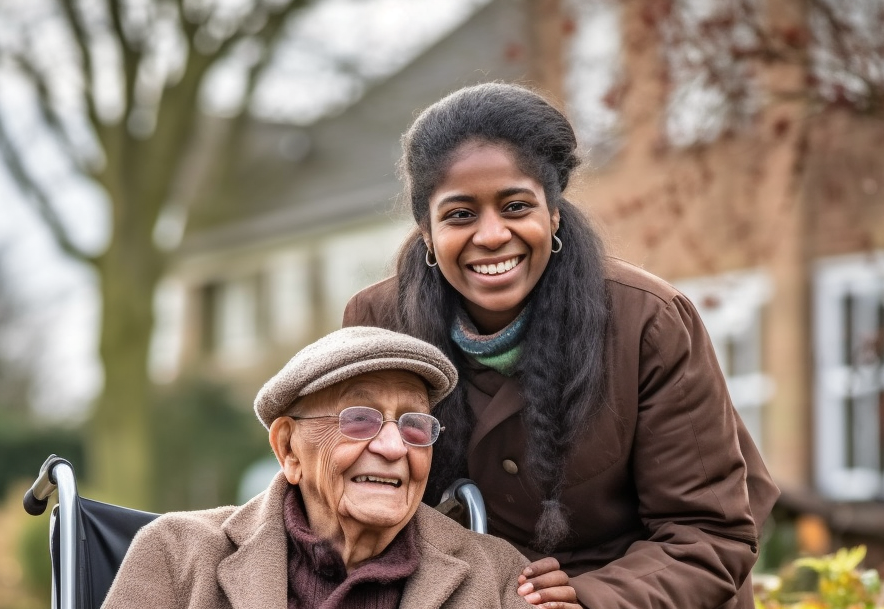- 29 May 2023
- Posted by: bright
- Category: Health & Wellness

As we age, it’s common for our physical health to become a priority. We focus on eating healthily and staying active, but what about mental health? The importance of mental health in elderly care cannot be overstated.
Many seniors experience isolation and loneliness as they age, which can lead to depression or anxiety disorders. This can result from losing friends or family members due to old age, retirement, or living away from loved ones without access to social support networks.
In this article, we’ll explore the crucial role of caregivers in promoting good mental well-being among their service users and discuss how activities such as music therapy can improve cognitive function.
Depression: A Silent Epidemic Among Older Adults
While ageing is a natural process that every individual must go through, leaving behind the routines to which you have become accustomed comes with immense emotional weight. For many older adults, this can lead to loneliness and isolation.
Depression is a common issue among seniors and it’s often referred to as the “silent epidemic” because many cases go undiagnosed or untreated due to the stigma surrounding mental health issues. Depression in elderly patients could also be caused by various factors, such as chronic illnesses that limit their independence and mobility or changes in personal circumstances like being alone for long periods without close contact with loved ones.
How Caregivers Can Help
Caregivers play a vital role in promoting good mental health amongst elderly patients by providing companionship and offering activities like board games and movie nights. Regular social interaction through outings outside the home can help keep depression at bay.
Understanding the challenges that seniors face in maintaining self-care routines, coupled with physical restrictions, allows caregivers to provide proper attention towards addressing not only medical needs but psychological wellness too, ensuring a holistic approach to healthcare provision.
One form of therapy that is especially beneficial for seniors is music therapy. Research shows that listening to or engaging in musical activities can positively impact mood, memory, and cognitive function. Some studies suggest that regular engagement in music therapy may even slow the progression of Alzheimer’s disease.
Activities such as singing classic tunes from their youth could spark happy memories and foster bonding experiences amongst peers in elder care homes and assisted living environments. Thus, caregivers should practise holistic treatment approaches, tailoring their care to unique interests. The varied aspects of mental healthcare requirements should be met, and routine expectations for each visit should prioritise client participation.
In addition to physical exercise programmes, integrating mindfulness and meditation relaxation techniques has been proven to significantly reduce cortisol levels in the body and improve concentration ability. These practices have notable benefits for improving memory abilities and promoting brain stimulation, minimising the chances of developing Alzheimer’s disease and other ailments.
Encouraging a positive outlook through routine cognitive exercises like reading books or playing memory games and the regular use of electronic devices such as tablets, can make life simpler and more accessible for senior adults. This helps boost their confidence about retaining some level of autonomy, which positively influences mental health by easing the social stigma usually tied to dementia. It also boosts self-esteem and instils more dignity across elderly assisted living programmes.
Conclusion
In conclusion, when it comes to elderly care provision in modern society, what matters most is achieving excellent physical fitness through planned workouts and specific lifestyles, coupled with practical lifestyle improvements and regular medical check-ups. The support of home care services can ensure a solid mind-body connection, optimising cognition and promoting a restful state to improve metabolic rate, relieve pain and anxiety, and enhance immune responses, thereby reducing susceptibility to illnesses and infections.
Equally essential is that caregivers provide ample time daily to nurture therapy involving recreational activities, music therapy, and mindfulness practices tailored to the unique interests of each patient.
Caregiving environments must be nurturing, with a welcoming atmosphere filled with compassion towards supporting elders who may be experiencing mental or physical limitations, but who still actively want to enjoy life independently. This shift from focusing only on medical treatment interventions to emphasising well-being and harmonising a holistic approach to healthcare provision must become a universally recognised change. Professionals and caregiving institutions alike must align their goals to prioritise both emotional and physical needs, resulting in happier seniors all around us.

